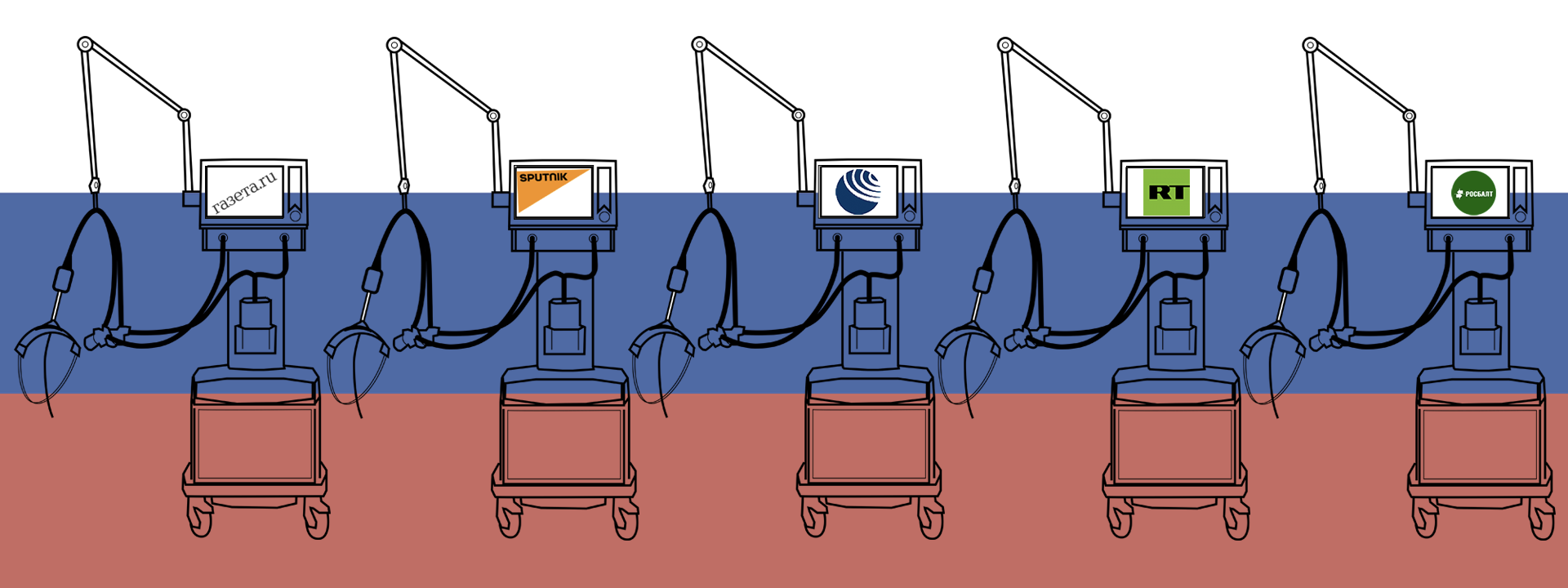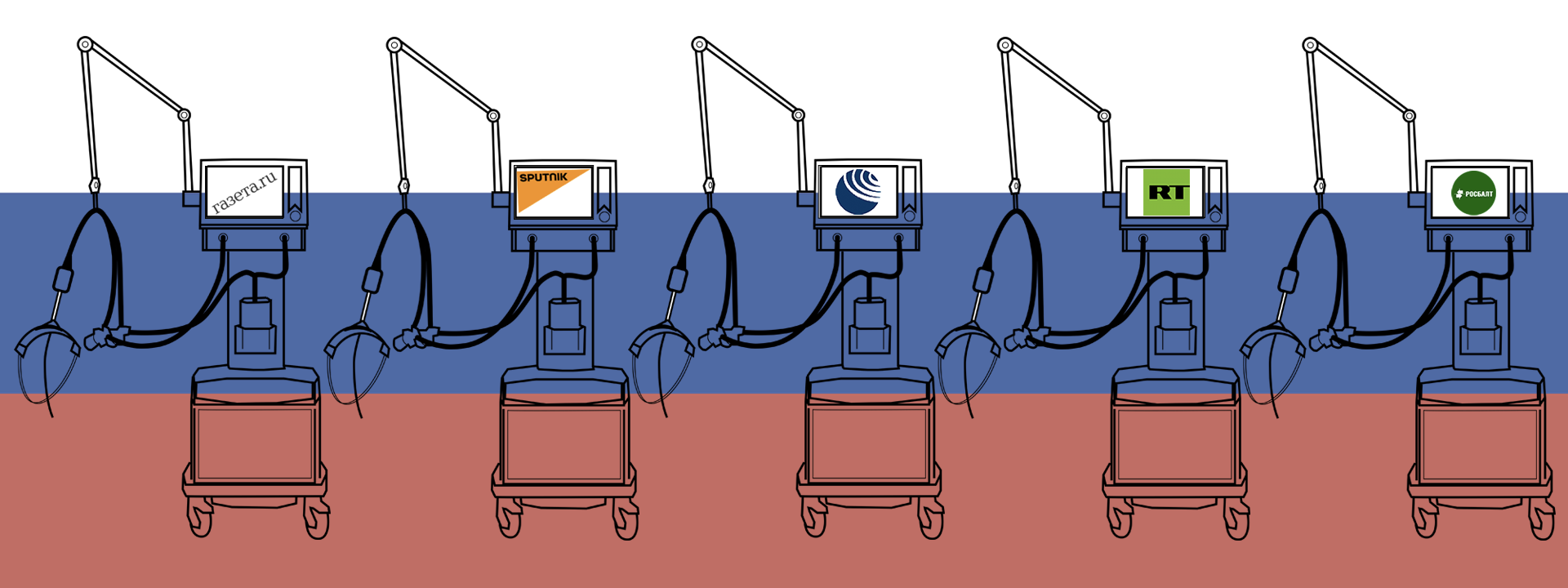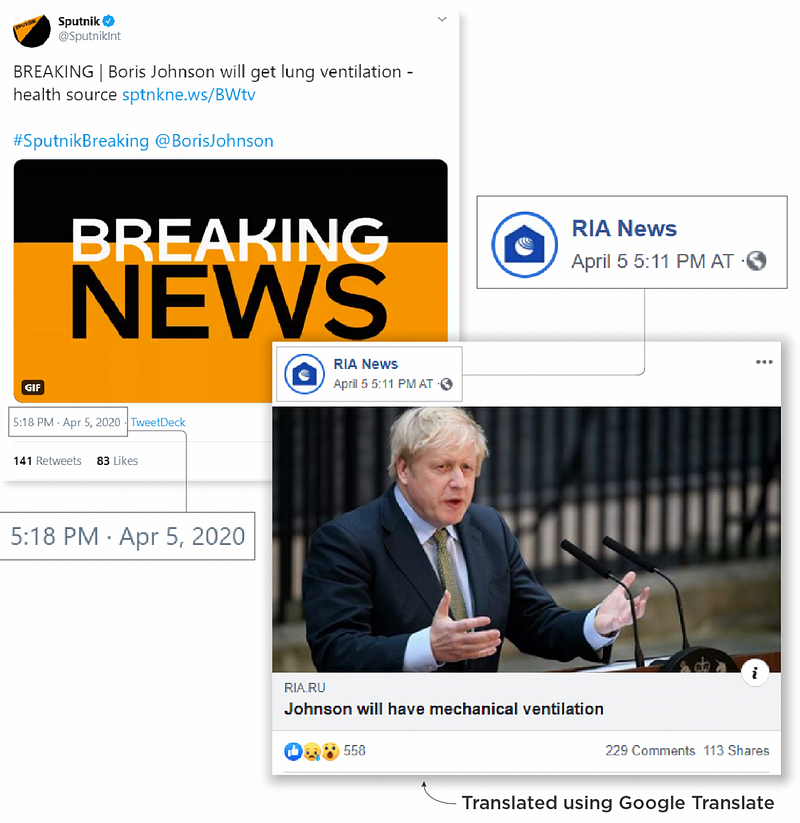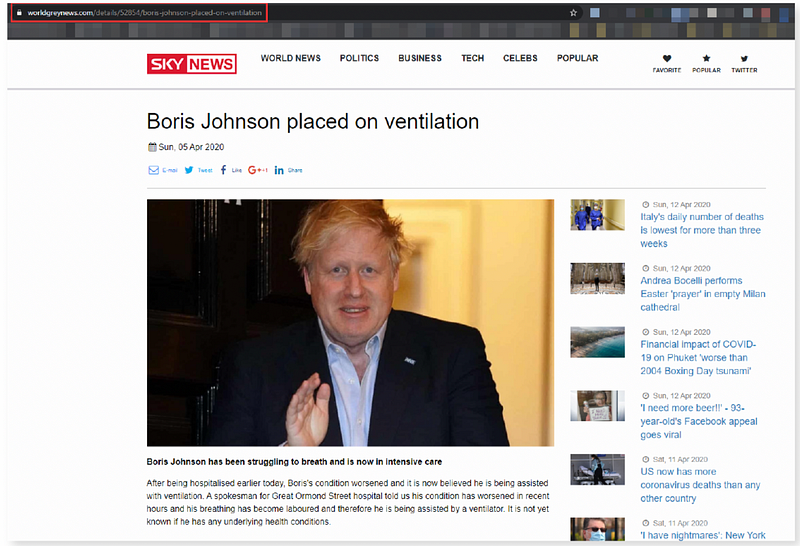Russian disinfo targets UK Prime Minister’s hospitalization
Russian campaign transforms Boris Johnson’s supplemental
Russian disinfo targets UK Prime Minister’s hospitalization

Russian campaign transforms Boris Johnson’s supplemental oxygen support into far more ominous ventilator treatment

Amid UK Prime Minister Boris Johnson’s hospitalization after testing positive for COVID-19, disinformation about the severity of his condition originated on Russian state media outlets before spreading on social media.
With news that Prime Minister Johnson has left the hospital and his condition is continuing to improve following a three day stint in intensive care, further facts emerged from a harrowing week of speculation amplified by mistruths by the Russian Federation, the most significant of which was the false claim that the prime minister had been placed on a ventilator.
This simple fabrication conveyed far-reaching implications and forecasted a dire scenario for the prime minister’s well-being, given that ventilators are used as a last resort for struggling COVID-19 patients. A recent report published by the Intensive Care National Audit & Research Centre in London found that 33 percent of patients in need of treatment from ventilators survived. The use of a ventilator, involving the mechanized operation of the patient’s lungs, is significantly more invasive and dire than the PM receiving supplemental oxygen, which was widely reported in Western press. While any stint in an intensive care unit is serious, any claims of Johnson allegedly requiring ventilator support would imply a truly grave situation for the prime minister and the United Kingdom itself.
An escalating narrative
On March 27, the prime minister announced on Twitter that he had contracted the novel coronavirus. Ten days later on April 5, he was admitted to the Intensive Care Unit (ICU) at St. Thomas’ Hospital as a precautionary measure where he would be closely monitored. Shortly thereafter, Russian media outlets mobilized to spread false information about the details of Johnson’s treatment in what appears to be a coordinated effort.
A tweet and accompanying article posted by Sputnik was among the first media coverage on the prime minister’s hospitalization, reporting made just three minutes behind the BBC on April 5, 2020. An hour after the initial announcement, Russian state-operated media outlet RIA Novosti posted an article of their own via Facebook claiming that the prime minister would have “mechanical ventilation.” This was followed seven minutes later by another Sputnik tweet claiming that Johnson would be put on a ventilator, an update attributed to “a source close to the UK healthcare authorities.”

These inauthentic updates, made just minutes apart, were likely coordinated with the intent to bolster the apparent authenticity of the reports as the news appeared to “break” across platforms, publications, and languages concurrently.
Soon after the story was published on Russian state media, it was picked up by others in a number of languages, some citing Sputnik and RIA Novosti, others making no mention of the source of the unsubstantiated information. The reports appeared on RT, Kommersand, Life.ru, 24tv.ua, rosbalt.ru, and antena3.ro, among others. Gezeta.ru, meanwhile, reported that he would be put on a ventilator if necessary, but then stated the use of a ventilator as fact in the accompanying video clip and on Facebook and Twitter.
Business Insider Italia, which cited Ria Novosti as its source, amassed the most engagement by far, reaching 13,260 shares on Facebook according to media monitoring tool Buzzsumo. The amount of engagement the false narrative received from this post is significant because it spread beyond the Russian language and in a country hard hit by coronavirus in which Russia has been on a charm-offensive, sprinkled with disinformation, emphasizing its aid to Italy.
English-language coverage of Johnson’s alleged ventilator treatment took place predominantly on smaller blogs, and on social media. A post on the site WorldGreyNews propagated the narrative of the PM’s treatment by impersonating the style of the popular news media outlet Sky News. Displaying the trademark and branding of a credible media outlet as a trojan horse for delivering disinformation is a common tactic among disinformants. Worldgreynews is a site dedicated to such forms of manipulation under the guise of “comedy” or “satire,” which is not made immediately clear on the website.

Johnson, who became the first world leader hospitalized from COVID-19, was never officially reported to have undergone ventilation during his treatment for the virus, and subsequently released after marked improvements in his condition. Russian state media outlets’ concerted effort to spread disinformation suggesting that the Prime Minister of the United Kingdom would require lung ventilation and in turn, face a significant chance of death, indicates an effort to undermine UK morale and instill fear during a time of turmoil.
This particular instance of disinformation could be characterized as a simple mistruth, a fabricated detail that in most other cases might have little or no effect on its target population. However, exaggerating the condition of a world leader’s health as they fall ill to a virus that has become the subject of a world-wide pandemic provides a unique backdrop that could have sent the United Kingdom and its citizens into panic.
If not for a prompt response from the prime minister’s office and vigilant reporting to set the record straight, the Russian-made fabrication could have achieved its goal in upending the resolve of the British populace at a potentially devastating time.
Max Rizzuto is a Research Assistant at the DFRLab based in Washington, D.C.
Follow along for more in-depth analysis from our #DigitalSherlocks.

